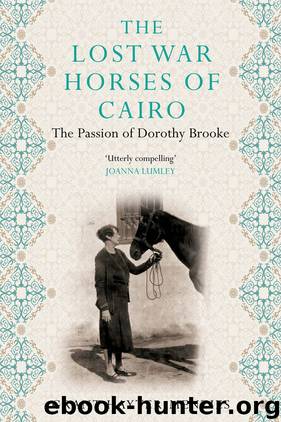The Lost War Horses of Cairo by Grant Hayter-Menzies

Author:Grant Hayter-Menzies
Language: eng
Format: epub
Publisher: Allen & Unwin
Published: 2017-12-18T05:00:00+00:00
7. Going Home
Those that were past enjoyment of any sort were put down at once. But at least they pass on to the sound of an English voice, speaking kindly.
—DOROTHY BROOKE
Even before it could open for business, the Old War Horse Memorial Hospital had to be inspected and approved by the Ministry of Health. Knowing the most critical area was that part of the property set aside for euthanization and cleanly disposing of remains, Dorothy had put all her reliance on the advice of an expert in configuring drainage and establishing standards of disinfection. Her trust proved well placed. When ministry officials came to examine the hospital, “I held my breath during their minute inspection of the floors and drains,” Dorothy wrote. “My relief cannot be described when all was pronounced satisfactory.”1
This hurdle cleared, Dorothy could concentrate on who would run the hospital on a daily basis and, particularly, on who could be trusted to do so while she and Geoffrey were on leave. She hired Maj. Roland Heveningham as chief veterinarian; along with Col. C. R. Spencer, Heveningham would also carefully document each patient in photograph albums that are still archived at the Brooke Hospital for Animals in Cairo. Everyone with any experience with horses came forward to help, including Geoffrey’s personal groom, Fred Baraby, who would pay visits on the patients and check on their general comfort. Soon the hospital even had its own guardian, Mohammed Aziz. A gravely handsome older man with a face as stonily inscrutable as Rushdi Effendi’s was open and bright, Mohammed Aziz kept a strict eye on all security measures and stayed close to Dorothy.2
During her hours spent at the Cairo SPCA Dorothy had learned a great deal about veterinary medicine, and she had also picked up hints of how to run a similar organization. Though she had a hand in everything to do with the hospital, she realized that somebody had to be put in charge of the small army of syces who looked after the horses’ everyday needs. Syces attended each buying day, leading the patients back to the paddock area; they fed and watered them in their stalls and took away those selected to be put to sleep. These men knew their jobs inside and out, but like any group they needed a supervisor to organize their activities each day. Dorothy discussed this with her committee members, who all concluded that the person in question should first of all be English. Egypt was no longer Britain’s to boss around, but there remained as much an English as an Arab stereotype in which any situation requiring organization could only achieve it under English control. English horse experts proliferated throughout what had been the British Empire; they had held this preeminence for so long, whether in India or Egypt, that an understanding of hierarchy had developed between English and native horse people, and the English were usually the ones in charge. This part of the committee’s recommendation would not have been difficult
Download
This site does not store any files on its server. We only index and link to content provided by other sites. Please contact the content providers to delete copyright contents if any and email us, we'll remove relevant links or contents immediately.
We're Going to Need More Wine by Gabrielle Union(19034)
Pimp by Iceberg Slim(14488)
Bombshells: Glamour Girls of a Lifetime by Sullivan Steve(14056)
The Radium Girls by Kate Moore(12018)
Becoming by Michelle Obama(10020)
Educated by Tara Westover(8045)
The Girl Without a Voice by Casey Watson(7885)
Wiseguy by Nicholas Pileggi(5770)
The Wind in My Hair by Masih Alinejad(5091)
Hitman by Howie Carr(5089)
The Rules Do Not Apply by Ariel Levy(4957)
Hunger by Roxane Gay(4922)
On the Front Line with the Women Who Fight Back by Stacey Dooley(4870)
Year of Yes by Shonda Rhimes(4754)
The Borden Murders by Sarah Miller(4313)
Papillon (English) by Henri Charrière(4262)
Joan of Arc by Mary Gordon(4100)
American Kingpin by Nick Bilton(3875)
Patti Smith by Just Kids(3774)
